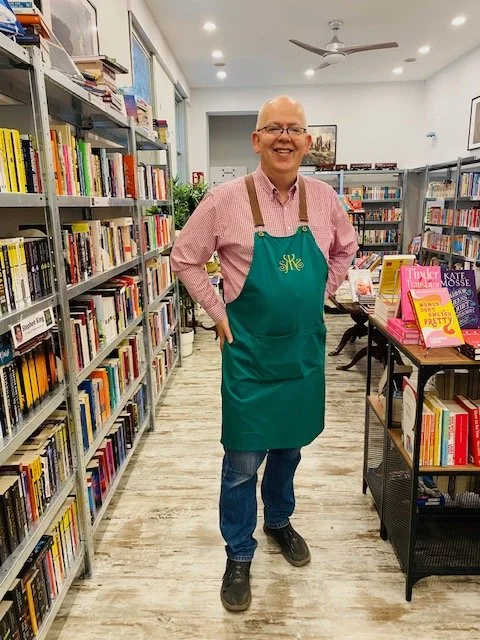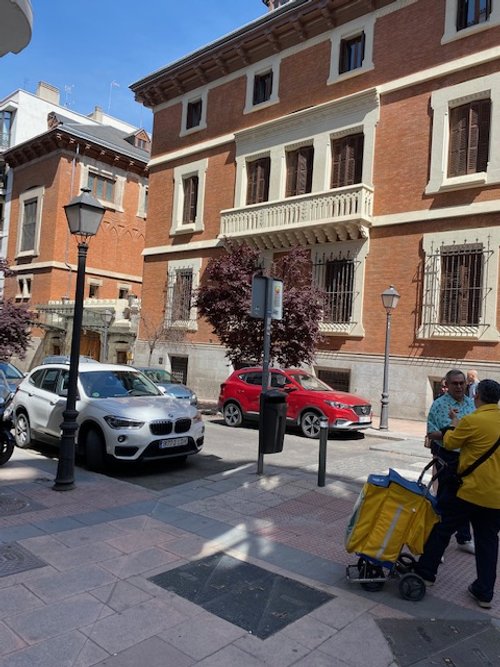Literary Madrid: In Search of Langston Hughes and A New English-Language Bookstore
Recently I took a trip to Madrid for a conference on creative writing. While I was there, of course I had to put my literary tourist hat on. I had two literary destinations I wanted to visit; the Secret Kingdoms Bookstore, reportedly the city’s largest English-language bookstore; and the building where African American poet, journalist, and author, Langston Hughes lived when he was in the city covering the Spanish Civil War in 1937. The bookstore was easy to find, but I had to do some serious detective work to find the house where Hughes laid his head at night during his time as a war correspondent. But, don’t worry, I found it!
The Secret Kingdoms Bookstore is a Dream Come True
David Price is the owner of the Secret Kingdoms bookstore in Madrid. It is now the largest English-language bookstore in the city.
The Secret Kingdoms bookstore is a dream come true for English-speaking expats in Madrid, and for bookstore owner, David Price. A former banker who took himself on the famed Camino de Santiago after becoming redundant at his corporate bank job, Price realized that he didn’t want to go find another job in the banking industry. Instead, the life-long literature lover, decided to pursue his childhood dream of opening a bookstore. “I thought, if not now, then when,” Price told me when I got the chance to interview him at his store. To prepare, Price took classes on running a bookstore, reconnected with the expat community in Madrid, where he has lived since 1991, and studied the English-language bookstore landscape throughout Spain.
Price was walking the Camino de Santiago in November 2021. The Secret Kingdoms bookstore opened its doors on June 20, 2022.
Tucked in at Calle Moratin 7, in the Barrio de Letras neighborhood of Madrid, Price confirmed that his store is now officially the largest English language bookstore in Madrid, that is “large” as in square-footage and the amount of books. The shop has a sizable selection of new books in English, as well as big back room of used books for sale as well. The store is quite spacious and the back room also plays host to regular literary events, from writing group gatherings to book club meetings.
What impressed me the most about the Secret Kingdoms was the thoughtfulness in the selection of books. It’s obvious Price is thinking about the needs and wants of his customers. In addition to a wildly diverse selection of fiction and nonfiction, with equal representation of American and British authors, there is an entire collection of books about Spain, by Spanish authors in translation. I also picked up a book to help me improve my Spanish language skills. In other words, Price understands the expat experience and has built a bookstore with familiar authors “from home” but also, he’s showcasing a lot of titles that will help expats better understand their new adopted country of Spain.
Bonus, I was also happy to see a nice selection of books by Black authors, books that focused on the LGBTQ experience, and a great display on feminist authors. The only section of the store that I felt needed a bit more diversity was the kids section, and Price readily admitted that he was choosing books based on his own childhood favorites and promised to widen his selection. Fun fact, the store did have all of the Little House on the Prairie books on sale.
All told, the Secret Kingdoms bookstore is a delightful shop to visit in Madrid. And it’s obvious that David Price is enjoying every minute of seeing his dream come to life.
In Search of Langston Hughes
When I went to the Secret Kingdoms bookstore, I was hoping to come across a copy of Langston Hughes’ book, I Wonder as I Wander, which details his life during the 1930s when he did a lot of traveling. Included in this tome are his recollections from his time as a war correspondent covering the Spanish Civil War in 1937. I wanted to get a copy of the book with the hopes that it would provide some clues as to where Langston lived while he was in Madrid. Sadly, they did not have the book.
As a literary tourist, I’m always looking for the locations where my favorite writers and authors did their best work, or where they found their greatest inspiration. Even though Langston Hughes was only in Spain for six months in 1937, supposedly the experience had a profound effect on his future writing and politics. Not to mention, he was one of the few American journalists sent to cover the Spanish Civil War, and for that reason alone, he should be recognized with respect and distinction.
Determined to find the place where Langston lived in Spain, I put on my detective hat and fired up my fingers and hit the Google.
Living with the Antifascists during the Spanish Civil War
I spent hours combing through the scant online documentation about Langston Hughes’ time in Spain. I know the information I was looking for exists, but not necessarily in public records or in the popular press. Still, by piecing different bits of stories together, I found out that while he was in Madrid, Langston Hughes was a guest of the Alianza de Intelectuales Antifacistas (Alliance of Anti-Fascists Intellectuals). The Antifascist Intellectuals was a group of writers and some artists, who joined forces to try to save the literature and art that was being burned and banned by the fascist military and soon-to-be leaders of the Spanish government during the war. They had already seen progressive writers like Frederico Garcia Lorca executed for his beliefs and his writings and so they formed an alliance to literally protect the written word before it could be destroyed. Led by famed Spanish poet, Rafael Alberti, this was the group that welcomed Langston Hughes to Madrid and invited him to stay with them in their palace. Yes, the antifascists lived in a palace.
Langston Hughes Lived in a Palace
Langston Hughes accepted Alberti’s offer for lodging and made their palace his home away from home during his months in Madrid. And indeed, it was a literal palace, known as the Zabalburu Palace. According to records I read, the antifascists group took over the palace, after the owners fled the city to escape the bombing. Today, they would have been thought of as squatters, but back then, to many fighting for the Republic, they were heroes.
This is the palace where Langston Hughes stayed during his months in Spain! Make it a literary pilgrimage destination, the next time you’re in Madrid.
I assumed this luxurious palace would have been destroyed in the war, but it wasn’t! As matter of fact, the granddaughter of one of the original owners still lives in a part of the palace, but the rest of the building is being used as a private library open only by appointment. I found a plaque on the wall indicating that it was originally known as the Zabalburu Palace, but there was nothing that indicated that it was once the headquarters of the Antifascist Intellectuals. I met a nice man who worked as a guard at the building and he confirmed that this was indeed the former headquarters of the Antifascist Intellectuals, but there would never be any glorification of that fact. Apparently, the owners were horrified by the so-called squatters using their home and want nothing of their time in the palace memorialized. Luckily, our friend Langston, wrote all about his experiences in the palace with his writer friends so, sorry rich Spanish family, the memories will continue to live on. FYI, Ernest Hemingway also spent time at the Palace with the Antifascists writers as well. I don’t know if Hemingway and Hughes crossed paths as the palace, but Hemingway did throw Langston a going away party on his last day in Madrid.
If you’d like to go see where Langston Hughes lived in Madrid, The Zabalburu Palace is located at Calle Marqués del Duero 7, right off the Calle Alcala behind the James Joyce Pub. How’s that for a literary city!
Madrid is a Literary City
Madrid is indeed a literary city with so much to offer readers and writers alike.
Indeed, Madrid is a literary city with countless bookstores, libraries, and literary events happening all the time. What’s more, there is a plethora of literary history steeped in the very streets and spirits of Madrid. There is even an entire neighborhood known as the Barrio de Letras known for the fact that Cervantes, Lope de Vega and several other Spanish literary greats once called the neighborhood home. I am sure I will return to Madrid for more multicultural literary tourism trips. If you have any suggestions for where I should go, or what I should see, please leave your ideas in the comments. Thank you!



